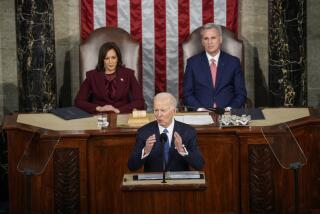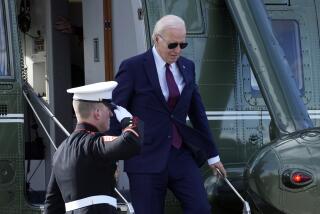Obama starts push for immigration reform
LAS VEGAS — President Obama flew to this once-red state, turned blue largely by the votes of Latinos, to launch an effort to overhaul the nation’s immigration laws. But in doing so, he carefully avoided ultimatums that might disrupt bipartisan talks underway in the Senate and House.
Even as Tuesday’s venue in Nevada dramatized the political shifts that have strengthened Obama’s hand in the immigration debate, he struck a cooperative note. He praised the progress in the Senate, saying proposals so far were “very much in line” with his own principles, and he sought to emphasize common ground on an issue that has confounded Congress repeatedly for more than a decade.
“I’m here today because the time has come for common-sense, comprehensive immigration reform. Now’s the time,” the president said as a boisterous crowd began to chant, “Si se puede.”
White House officials made it clear that on several important details, the president prefers a more liberal approach than the one outlined Monday by eight senators — four from each party.
He would like to see a faster, simpler path to citizenship for the estimated 11 million people who live illegally in the U.S. His preferred plan would also put less emphasis on additional border security. But unlike the negotiations over the budget, which have dominated much of Obama’s time since November’s election, so far he has chosen to avoid confrontation on immigration.
Obama did insist that if Congress failed to move forward “in a timely fashion,” he would send up a bill and insist that lawmakers vote on it immediately.
That line drew cheers from a crowd of immigration reform proponents who have grown weary of false starts and broken promises. But it was the one stick in a speech that was otherwise mostly carrot.
It is an approach made possible by November’s election results, which rattled many Republicans. Now, they seem willing to hand Obama a significant legislative victory so long as he doesn’t claim it as his own.
Obama seems ready to take that deal — at least for now, while activity on Capitol Hill is moving toward compromise.
The bipartisan Senate plan was unveiled Monday — sooner than planned. The schedule was expedited late last week after White House officials let out word of Obama’s plans to speak on the issue. A House group is working on a legislation that tracks closely with the Senate proposal.
That compromising mood could dissipate in the months ahead as lawmakers begin to grapple with the details, many of which separate Obama from members of Congress, and some of which divide the lawmakers themselves.
Obama’s plan does not have a temporary worker program, a provision often favored by businesses seeking to fill low-wage positions.
And while both plans would set up a way to grant legal status and eventual citizenship to illegal immigrants, the senators proposed delaying part of that process until stepped-up enforcement has produced a secure border — although they disagreed on exactly how that would be determined. Obama’s plan has no such requirement, offering a swifter, “clear” path to citizenship, White House officials emphasized.
The so-called enforcement triggers may prove crucial to winning enough support from conservative lawmakers to pass legislation. Sen. Marco Rubio, the Florida Republican who has positioned himself as a leader on the right and signed on to the bipartisan blueprint, said he was concerned that the president appeared unwilling to accept that part of the proposal.
“Without such triggers in place, enforcement systems will never be implemented and we will be back in just a few years dealing with millions of new undocumented people in our country,” Rubio said.
But Rubio said he was encouraged that Obama’s proposal excludes immigrants who have been granted provisional legal status from benefits under the new healthcare law, limiting the price tag for immigration reform.
Obama’s proposal would require applicants to pay fines and submit to criminal background checks before being granted provisional legal status. Applicants could then apply for a green card, after paying additional fees, learning English and civics, and waiting until a backlog of legal applicants is cleared. How long that process could take remains another point of contention. Obama has proposed steps to quickly reduce the legal backlog, but conservatives may reject those steps.
Under the president’s plan, same-sex married couples would have the same rights as heterosexual couples to sponsor partners for legal immigration status, a right not included in the Senate plan.
His proposal also calls for new measures to deter employers from hiring undocumented workers. The plan would make federal databases more widely available for verifying eligibility and would mandate tamper-resistant Social Security cards and worker permits.
Emphasizing the idea that the U.S. is a nation of immigrants, Obama said, “A lot of folks forget that most of ‘us’ used to be ‘them.’ ... Unless you’re one of the first Americans, a Native American, you came from someplace else. Somebody brought you.”
House Speaker John A. Boehner (R-Ohio) warned the president against mucking up the bipartisan work on Capitol Hill.
“There are a lot of ideas about how best to fix our broken immigration system,” said Boehner’s spokesman, Brendan Buck. “Any solution should be a bipartisan one, and we hope the president is careful not to drag the debate to the left and ultimately disrupt the difficult work that is ahead in the House and Senate.”
But a group of U.S. labor leaders, educators, clergy and civil rights advocates said they thought Obama was hitting the right tone.
“He stressed both parties coming together but assured us that ‘if this causes delay and things don’t happen, I’ll step in,’” said Frank Sherry, executive director of America’s Voice Education Fund. “I think Republicans who feared he might big-foot the process were glad he didn’t, and Democrats are happy that he was assertive and put the Republicans on notice that he won’t wait forever.”
White House officials said the president would wait to see how the process developed. Past battles with lawmakers — largely over the budget — have built toward clear deadlines or expiration dates, but the fight over immigration is more fluid. So is Obama’s approach, said White House senior advisor Valerie Jarrett in a recent interview.
On the budget, she said, Obama has “clear ideas” of what he wants to accomplish and wants to “be clear way in advance” about what he would be willing to accept.
Other issues, such as immigration, Obama sees as “causes that can actually bring our country together,” she said, and he would prefer to avoid confrontation with Congress.
kathleen.hennessey@latimes.com
Brian Bennett, David Lauter and Lisa Mascaro in Washington and John Glionna in Las Vegas contributed to this report.
More to Read
Start your day right
Sign up for Essential California for news, features and recommendations from the L.A. Times and beyond in your inbox six days a week.
You may occasionally receive promotional content from the Los Angeles Times.








